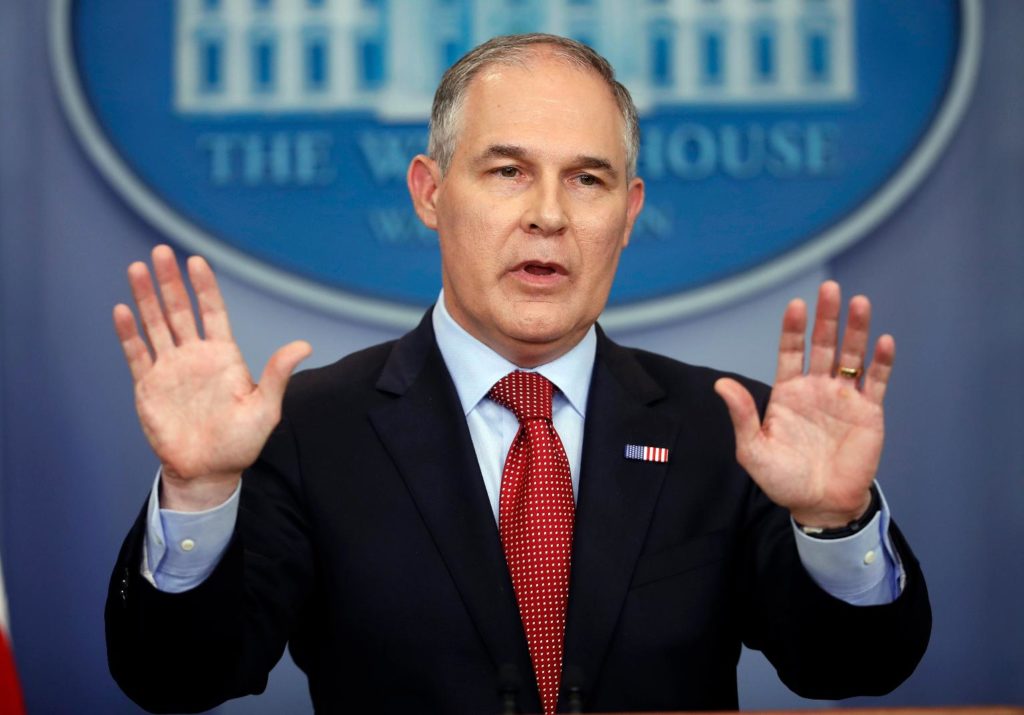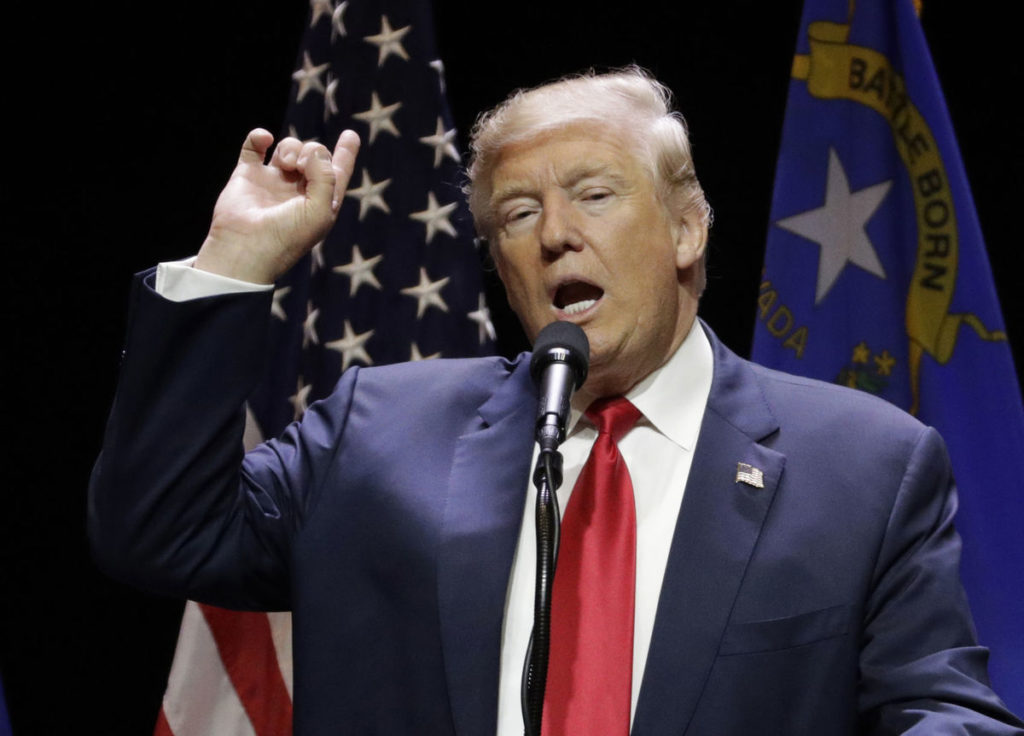Federal employees ordered to attend anti-leaking classes

Employees at the Environmental Protection Agency are attending mandatory training sessions this week to reinforce their compliance with laws and rules against leaking classified or sensitive government information. It is part of a broader Trump administration order for anti-leaks training at all executive branch agencies. The Associated Press obtained training materials from the hourlong class. Government employees who hold security clearances undergo background checks and extensive training in safeguarding classified information. Relatively few EPA employees deal with classified files, but the new training also reinforces requirements to keep “Controlled Unclassified Information” from unauthorized disclosure. The EPA occasionally creates, receives, handles and stores classified material because of its homeland security, emergency response and continuity missions. EPA employees also work closely with contractors and other federal agencies that more regularly handle classified information. President Donald Trump has expressed anger repeated leaks of potentially embarrassing information to media organizations in recent months. In a speech last month, Attorney General Jeff Sessions said those responsible for the “staggering number of leaks” coming out of the administration would be investigated and potentially prosecuted. “We share the White House’s concern with the unlawful leaks throughout the government,” Justice Department spokesman Ian Prior said Wednesday. EPA officials did not immediately respond to messages seeking comment Thursday. A three-page fact sheet sent to EPA employees as part of the training warned that leaks of even unclassified information could have serious consequences to national security. “Enemies of the United States are relentless in their pursuit of information which they can exploit to harm US interests,” the document said. The document recounted past circumstances where government secrets had been spilled either through espionage, computer hacks or leaks to reporters. The examples included the 1980s spying case involving CIA counter-intelligence officer Aldrich Ames on behalf of the Soviets and a 1972 leak to columnist Jack Anderson about spying on members of the Soviet Politburo, which he disclosed in The Washington Post. The sheet also cited the 2015 hack of computers at the Office of Personnel Management, a data breach that compromised the names, Social Security numbers, birthdates and home addresses and other sensitive personal information for 18 million people. EPA staff was also reminded of the whistleblower protections afforded to federal employees who expose wrongdoing. The training materials directed them to do so through proper channels for reporting fraud, waste and abuse, including the inspector general’s hotline. Republished with permission from the Associated Press.
Drain the swamp’? Federal workers worried about Donald Trump’s plan

Melissa Baumann lives some 850 miles from the nation’s capital, but when she hears President-elect Donald Trump and his supporters say they will “drain the swamp,” she worries she will be sucked down into the muck. Baumann, a chemist with the Forest Service, is one of the nation’s 4 million or so federal workers and is watching anxiously as Trump looks to set his agenda in motion. In terms of policy, Trump has suggested a federal hiring freeze and hinted at eliminating or sharply curtailing an entire Cabinet agency, the Department of Education. In terms of rhetoric, he targeted the federal bureaucracy and regulations. And then there’s his “drain the swamp” catchphrase. Trump’s allies say that was directed at lobbyists, donors and political cronies. Some federal workers fear he means a broader group. “I believe that is directed at us. And it’s misdirected,” said Baumann, who lives in Madison, Wisconsin, where she also serves as a union officer for the Forest Service. The problems in Washington “have nothing to do with the people outside the Beltway” who are doing honorable work under difficult circumstances, she said. Like most federal workers, Baumann works far from D.C., where less than 10 percent of the federal workforce is stationed, government data show. Maryland and Virginia are large federal employment centers, but so are California, Florida, Texas and Georgia. Greg Guthrie, an information specialist with the National Technical Information Service in Alexandria, Virginia, said that after the initial shock of Trump’s win, he has adopted a “cautiously optimistic” stance. Trump won as a champion of the working class, he reasoned, and he hopes Trump will advocate for the federal working class as well as the private sector. Guthrie’s co-workers are sympathetic to technology’s disruption of the labor force, he said. The NTIS provides reports and research to a variety of customers. Internet search engines now fill some of that role, prompting senators to introduce the “Let Me Google That For You Act” in 2014 to kill the NTIS. But Guthrie said his agency has reinvented itself and now helps government agencies use big data. Guthrie said federal workers can adapt when given the opportunity. “I don’t like some of the terms I’m hearing, like ‘drain the swamp,’” said Guthrie, also an officer in his union. “Sometimes it’s couched as we’re these lazy, unnecessary relics. That’s not true. We’re people who work hard.” Corey Stewart – who chaired Trump’s Virginia campaign and serves as Board of Supervisors chairman in Prince William County, home to many federal workers – said “drain the swamp” was directed at the lobbying corps and Washington insiders who infiltrate the political system. The average federal worker doesn’t have much to worry about, he said, though he does expect reductions at the Department of Education, IRS and EPA, because Trump is skeptical of those agencies. Stewart said Trump’s promises to bolster defense will result in a net benefit for the capital region and the federal workforce. He said Trump won’t find much savings in the federal labor force because it has already been squeezed by budget cuts. The number of executive branch employees hasn’t been this low since 1965, government data show. Bill Dougan, president of the National Federation of Federal Employees, said that after the initial shock of Trump’s victory, many federal workers are adopting a wait-and-see attitude. Dougan suspects federal workers’ fate will depend largely on whether Trump’s inner circle is populated by establishment Republicans – even though they’ve been hostile to federal workers – or wild cards like Newt Gingrich, who engineered a government shutdown as speaker of the House, and Steve Bannon, the Trump adviser Dougan says embodies an ethos to “do everything he can to blow things up.” Dougan said he expects Republican attacks on federal salaries and pension benefits to continue, but he’s “hopeful that we’re going to see some appointments with some experience in government and how government works, or it’s going to be a real problem.” Still, he said, there’s some optimism that federal workers connected to defense and the Veterans Administration could see improvements, given campaign promises to increase spending there. But Kim Valavez, a social worker at a VA clinic in Santa Rosa, California, said the prevailing mood among workers there is fear. They worry a Trump administration may favor privatization over investing in the VA itself. “People are scared,” she said. “It feels like a great unknown.” Rep. Gerry Connolly, the ranking Democrat on a subcommittee overseeing the federal civil service, said he doesn’t expect the GOP-controlled Congress to oppose any Trump efforts to downsize the federal workforce. “I think if anything they will be more emboldened to scapegoat federal workers than before,” said Connolly, whose northern Virginia district is home to large numbers of federal workers and contractors. Republished with permission of the Associated Press.


